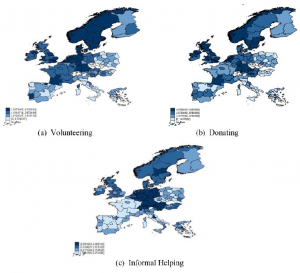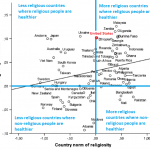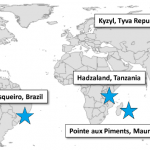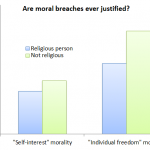 It’s well established that religious people tend to volunteer more and give more to charity than the non-religious. There are many factors that could contribute to this. Many charities that explicitly to support co-religionists or to promote religion, and what’s more religious people also tend to be older and married, both of which predict
It’s well established that religious people tend to volunteer more and give more to charity than the non-religious. There are many factors that could contribute to this. Many charities that explicitly to support co-religionists or to promote religion, and what’s more religious people also tend to be older and married, both of which predict
But what’s less well understood is how important religion is compared with other factors. In particular Jennifer Glanville (University of Iowa) and colleagues were interested to know how important trust levels and social networks were in encouraging charitable donations and volunteering.
They used data from the 2002 European Social Survey, which surveyed over 30,000 people across most countries of Europe. Among the many questions in this survey were ones about formal volunteering (for any of a range of sports, religious, political, or other voluntary groups), charitable donations, and informal volunteering (actively providing help for other people outside family, work or formal volunteering).
As the graphic shows the levels of these different amounts of voluntary and charitable activities varies quite widely across Europe. The question is, why?
What they found was that religious people actually tend to report being less likely to engage in informal voluntary help. Protestants and ‘Other Christians’ – but not Catholics or Orthodox – were, however, more likely to say that they did charity work or donated to charities.
Compared with religious affiliation, church going was more consistently linked to all kinds of charitable behaviour. That’s to be expected, since people who are actively engaged in church are also likely to be the kinds of people who engage in other social activities.
However, rather more important than belonging to a religion was how trusting they were, and the strength of their social ties (how often they met socially with friends, relatives, or work colleagues). These social factors are part of a broader concept termed ‘social capital’.
Trust was about one-third as important as educational levels in predicting both volunteering and charitable giving, and about half as important in predicting informal helping.
Unfortunately, the authors don’t really make clear the comparative importance of religion versus such social capital in driving charitable behaviour, although it is clear that religious affiliation is not important. Religious service attendance was about as important as more general social ties in predicting these behaviours.
They also found that average levels of trust in a region was critically important. Where trust was low in general, social ties didn’t improve voluntary and charitable acts. Where trust was high, social ties become much more important. They make this rather interesting point:
…social capital is an important contextual influence on generosity because community integration and trust increase information about opportunities for generous activities and the motivation for participating in these activities
In other words, the critical factor in driving generosity is bonds of trust and integration. And that, ultimately, is why central and northern European countries have relatively high levels of volunteering and charity.
![]()
Glanville, J., Paxton, P., & Wang, Y. (2015). Social Capital and Generosity: A Multilevel Analysis Nonprofit and Voluntary Sector Quarterly DOI: 10.1177/0899764015591366















